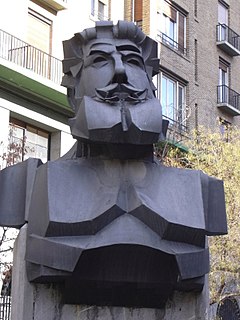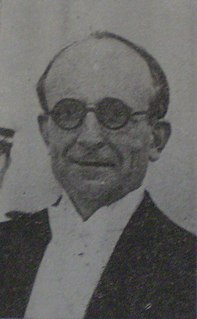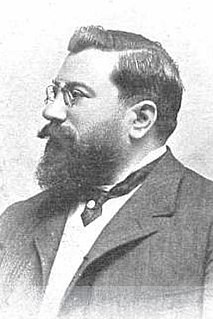 W
WAntonio Alcalá Galiano y Fernández de Villavicencio, was a Spanish politician and writer who served as Minister of the Navy (1836) and Minister of Public Works (1865). He was elected a Deputy for Cádiz in 1822 and served sporadically through ten successive legislatures, until his death.
 W
WLuis Araquistáin Quevedo was a Spanish politician and writer. Member of the Spanish Socialist Workers' Party (PSOE) from a young age, he belonged to the circle of Largo Caballero and Tomás Meabe, of whom he was a close friend.
 W
WManuel Azaña Díaz was a Spanish politician who served as Prime Minister of the Second Spanish Republic, organizer of the Popular Front in 1935 and the last President of the Republic (1936–1939). He was the most prominent leader of the losing Republican cause during the Spanish Civil War of 1936-1939.
 W
WJaime Luciano Balmes y Urpiá was a philosopher, theologian, Catholic apologist, sociologist and Spanish political writer. Familiar with the doctrine of Saint Thomas Aquinas, Balmes was an original philosopher who did not belong to any particular school or stream, to whom Pius XII qualified as the Prince of Modern Apologetics.
 W
WJoaquín Costa was a Spanish politician, lawyer, economist and historian.
 W
WJuan Donoso Cortés, marqués de Valdegamas was a Spanish author, conservative, Catholic political theorist and diplomat.
 W
WPedro Varela Geiss is a Spanish writer, revisionist historian, librarian, and Holocaust denier. He was the owner of a neo-nazi bookstore in Barcelona that is now closed, and he describes himself as a National Socialist inspired by Hitler. He was also the former President of the disbanded Neo-Nazi group CEDADE, to which Belgian Nazi collaborator Leon Degrelle belonged.
 W
WSalvador de Madariaga y Rojo was a Spanish diplomat, writer, historian, and pacifist. He was nominated for the Nobel Prize in Literature, and the Nobel Peace Prize. He was awarded the Charlemagne Prize in 1973.
 W
WRamiro de Maeztu y Whitney was a prolific Spanish essayist, journalist and publicist. His early literary work adscribes him to the Generation of '98. Adept to nietzschean and social darwinist ideas in his youth, he became close to Fabian Socialism and, later, to Distributism and Social corporatism during his spell as correspondent in London, from where he chronicled the Great War. During the years of the Primo de Rivera dictatorship he served as Ambassador to Argentina. A staunch militarist, he became at the end of his ideological path one of the most prominent Far-right theorists against the Second Republic, leading the reactionary voices calling for a military coup. Member of the cultural group Acción Española, he spread the concept of "Hispanidad" (Spanishness). Imprisoned by Republican authorities after the outbreak of the Spanish Civil War, he was killed by leftist militiamen during a saca in the midst of the conflict.
 W
WJosé Ortega y Gasset was a Spanish philosopher and essayist. He worked during the first half of the 20th century, while Spain oscillated between monarchy, republicanism, and dictatorship. His philosophy has been characterized as a "philosophy of life" that "comprised a long-hidden beginning in a pragmatist metaphysics inspired by William James, and with a general method from a realist phenomenology imitating Edmund Husserl, which served both his proto-existentialism and his realist historicism, which has been compared to both Wilhelm Dilthey and Benedetto Croce."
 W
WFrancisco Pi y Margall was a Spanish federalist and republican politician and theorist who served as president of the short-lived First Spanish Republic in 1873. He was also a historian, philosopher, romanticist writer, and was also the leader of the Federal Democratic Republican Party and the Democratic Party. Pi was turned into a sort of secular saint in his time.
 W
WOnésimo Redondo Ortega was a Spanish Falangist politician. He founded Juntas Castellanas de Actuación Hispánica, a political group that merged with Ramiro Ledesma's Juntas de Ofensiva Nacional-Sindicalista and José Antonio Primo de Rivera's Falange Española.
 W
WJesús Requejo San Román (1880-1936) was a Spanish Catholic militant, theorist of society and politician; the Catholic Church declared him a martyr and a candidate for sainthood. He was locally known in the provinces of Zamora and Toledo for his activity in education, charity and agrarian syndicalism. His key work, Principios de Orientación Social, made some moderate impact among Spanish Catholic intellectuals of the mid-1930s. Politically he evolved from centre-left to extreme right: initially Requejo supported the Romanonista dynastic Liberalism, then he turned towards accidentalist Acción Católica, and finally he joined Carlism. His career climaxed in the mid-1930s; since 1934 he headed the provincial Carlist structures in Toledo and in 1936 he served as a Carlist deputy to the Cortes.
 W
WWenceslao "Wenchesco" Emilio Retana y Gamboa (1862–1924), also known as W.E. Retana or Wenceslao E. Retana, was a 19th-century Spanish civil servant, colonial administrator, writer, biographer, political commentator, publisher, bibliophile, bibliographer, Filipiniana collector, Spanish filipinologist, and Philippine scholar. Retana was a "onetime adversary" of Philippine national hero José Rizal who later became an "admirer" who wrote the first biographical account of the life of Rizal entitled Vida y Escritos del Dr. José Rizal or "Life and Writings of Dr. José Rizal". Rosa M. Vallejo described Retana as the "foremost" non-Filipino filipinologist.
 W
WJuan Vázquez de Mella y Fanjul (1861–1928) was a Spanish politician and a political theorist. He is counted among the greatest Traditionalist thinkers, at times considered the finest author of Spanish Traditionalism of all time. A politician active within Carlism, he served as a longtime Cortes deputy and one of the party leaders. He championed an own political strategy, known as Mellismo, which led to secession and formation of a separate grouping.